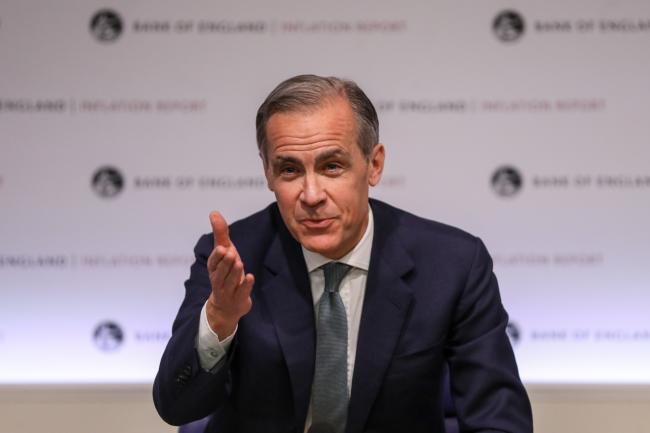(Bloomberg) -- Mark Carney is struggling to convince investors to take him at his word.
The Bank of England governor spent Thursday’s press conference making the case for faster interest-rate hikes than prices imply. Money markets barely budged, with investors seeing little chance of a move by the BOE this year, and the pound and gilts were similarly unimpressed.
The dull reaction may reflect skepticism that the bank’s Brexit assumptions will bear out. While fears of a no-deal departure from the European Union have faded since the two sides agreed to an extension of the exit deadline last month, investors doubt the impasse can be resolved any time soon after more than two years of chaos in British politics.
“Guess the market doesn’t believe Carney,” said Kristoffer Kjaer Lomholt, a Copenhagen-based strategist at Danske Bank A/S. “We don’t expect any hikes either. At least not on this side of Brexit.”
The pound fell as much as 0.3 percent to $1.3018 Thursday. The yield on the U.K.’s 10-year government bonds rose around four basis points on the day to 1.19 percent. Investors priced in about a 32 percent chance that the BOE would raise rates by the end of this year, close to where it was before the policy review.
Carney acknowledged that Brexit was creating a lot of uncertainty, and the bank reiterated that the issue was the biggest factor determining the outlook for the U.K.
Still, if there is a benign Brexit resolution, “with some form of relatively smooth transition to it, it will require interest rate increases over that period and it will require more and more frequent interest rate increases than the market currently expects,” he said.
Investors are predicting only one more quarter-point hike between now and 2021. That path is “unequal” to achieving the BOE’s inflation remit, the governor said. Policy makers raised forecasts for growth while keeping their prediction for inflation in two years at 2.1 percent, higher than their target.
The BOE also forecast excess demand emerging in 2021 which would have an upward impact on inflation beyond the bank’s forecast period.
Still, the bank said it saw little cost to waiting before taking action.
The BOE “currently prefers to adopt a ‘wait and see approach’ on interest rates until the Brexit situation becomes clearer and it can see how the economy is reacting,” said Howard Archer, chief economic adviser to EY Item Club. “The odds certainly favor the BOE keeping interest rates at 0.75 percent through 2019. However, it’s not a nailed-on certainty.”
